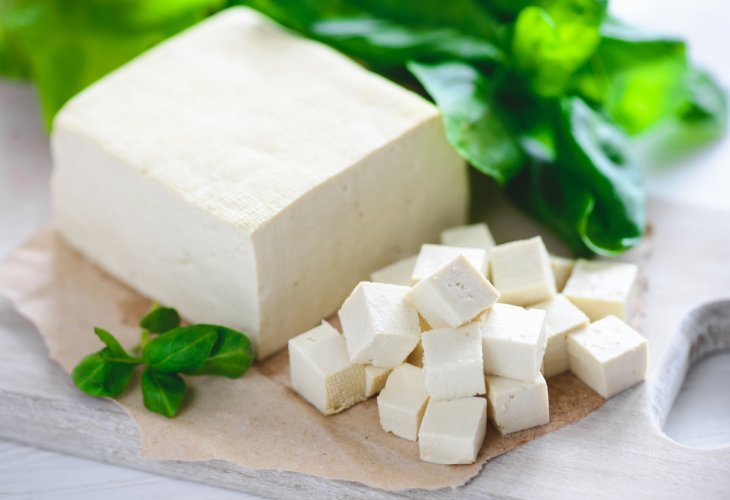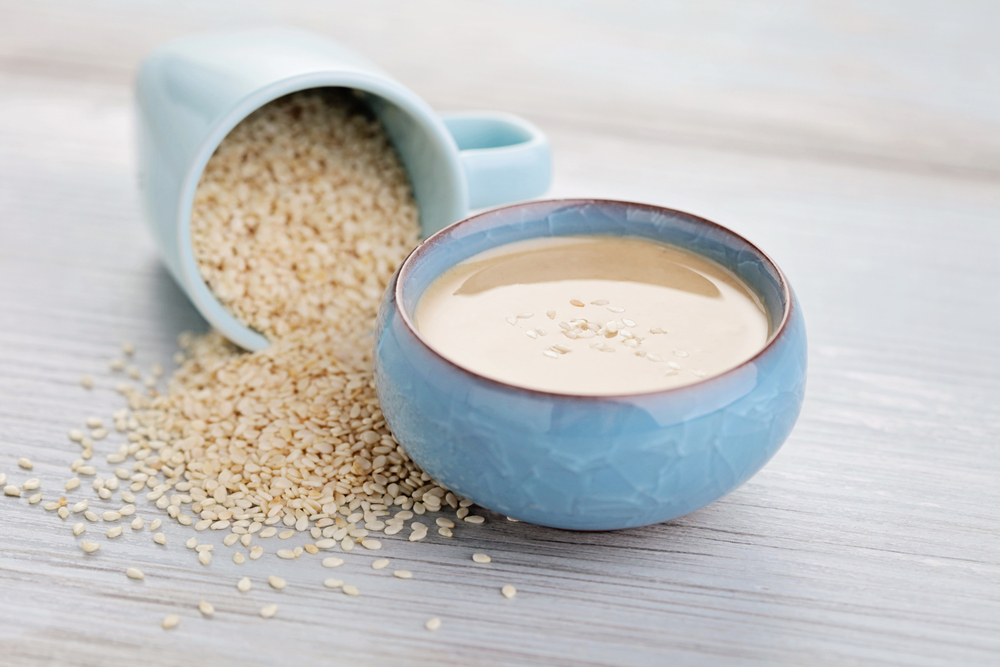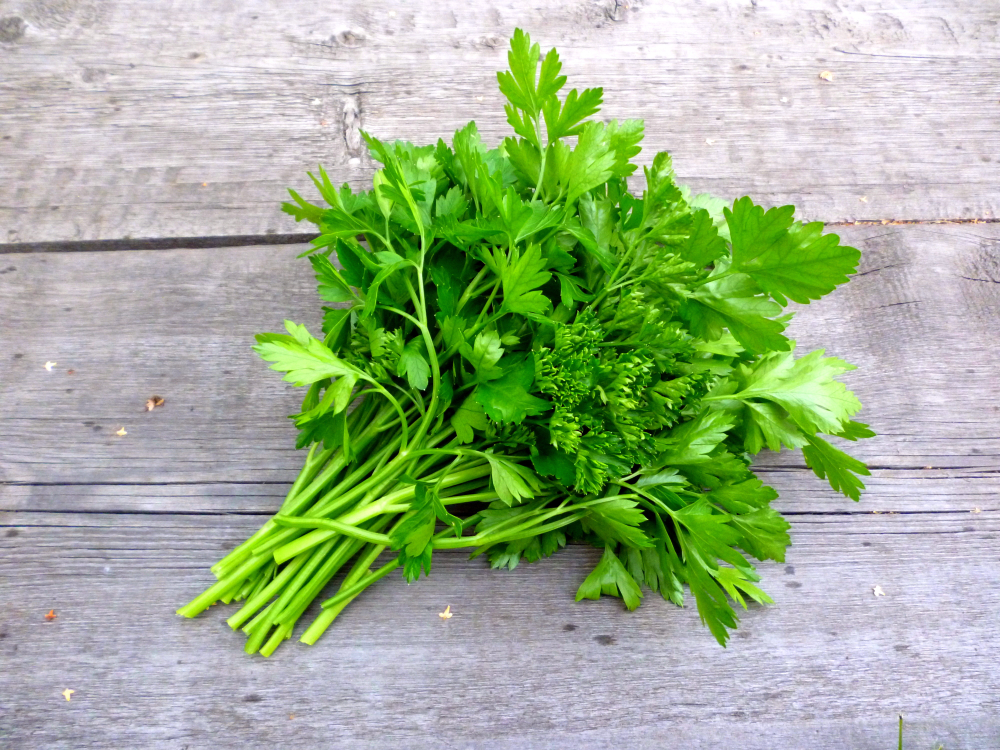Foods That Provide the Most Calcium. The List May Surprise You
In honor of World Osteoporosis Day, I have compiled a list of foods that provide the most calcium, much more than milk. Plus, recipes included.
 Tofu cheese (Photo: shutterstock)
Tofu cheese (Photo: shutterstock)When you say calcium, you say milk. Everyone in Israel knows that milk provides us with calcium. Indeed, 100 ml of unenriched milk (half a regular cup) provides 100 mg of calcium. In honor of World Osteoporosis Day occurring this month, let's meet friends who provide us with much more calcium than milk. The following list is in descending order and relates to 100 grams of food.
Seaweed: Provides 1,095 mg of calcium. Here in Israel, we've only discovered seaweed in recent years, mainly in sushi. Seaweed provides not only calcium but also a plethora of vitamins, minerals, chlorophyll, protein, and more. They help in many processes. They are high in salt, so it is recommended to wash them before use. However, even after washing, they still contain a significant amount of salt, and can be used as a salt substitute. Note! Seaweed grown in pools do not have the same nutritional values as those from the sea.
Who can't enjoy seaweed? 1. People taking a medication for an underactive thyroid gland, called "Euthyrox," because they are rich in iodine. 2. People taking Coumadin (a blood thinner), because it's rich in vitamin K.
Raw Tahini from Whole Sesame: Provides 854 mg of calcium. It's widely known that tahini is a source of calcium, but note the difference between the calcium content in white tahini and whole sesame tahini. The whole sesame contains four times more calcium, as the calcium is found in the sesame hull. The sesame hull also contains iron and magnesium. Whole sesame tahini is rich in antioxidants and dietary fibers, which reduce the harmful effects of free radicals. Tahini paste is made from water and raw tahini at a 1:1 ratio. Therefore, tahini paste contains half the calcium content of raw tahini (whole or white).
 (Photo: shutterstock)
(Photo: shutterstock)Carob Powder: Provides 597 mg of calcium. Carob powder doesn't have good public relations and is generally perceived as a pale substitute for good chocolate. But, carob has excellent values of its own and was not born just as a "placeholder." Besides plenty of calcium, carobs are rich in iron, zinc, magnesium, and more. You can enjoy them as a drink, a spread, a candy (watch out for extra fat and sugar), or by eating the fruit itself.
Hazelnuts: Provide 435 mg of calcium. Known also as filberts, they contribute 655 calories, which isn't negligible, but also provide dietary fiber that helps reduce cholesterol and balance sugar levels. They also contain potassium, magnesium, and vitamin E, which helps balance cholesterol levels and is an antioxidant. Since hazelnuts contain monounsaturated fatty acids, important to consume them fresh to prevent oxidation.
Soy Flour: Provides 270 mg of calcium. Soy flour contains more calcium compared to other flours. It's also rich in protein, dietary fiber, potassium, iron, magnesium, and vitamins B. Use it in baking bread, pies, patties, and more. Suitable for celiac patients as it's gluten-free.
Almonds: Provide 255 mg of calcium. Besides, they provide iron, magnesium, potassium, zinc, vitamins B, E, folic acid, plenty of dietary fibers, protein, and monounsaturated fat. The best way to eat almonds is fresh and in their skin. This keeps them protected from light and oxidation. However, small children, elderly with dental problems, and people who have had their gallbladder removed can have them as almond butter.
Parsley: Provides 205 mg of calcium. Additionally, it provides vitamin A, vitamins B, C, E, K, as well as iron, manganese, potassium, zinc, dietary fiber, and chlorophyll. Parsley is known for its diuretic property. It's good for high blood pressure or fluid retention situations. Add parsley at the end of cooking to retain its green color. It can be incorporated into many dishes like patties, pies, salads, and more. Since it's rich in vitamin K, it's not recommended for people taking Coumadin.
 (Photo: shutterstock)
(Photo: shutterstock)Tofu Cheese: Provides 205 mg of calcium. Additionally, it contributes phytosterols, which balance cholesterol levels, and phytoestrogens, which balance estrogen levels. It contains no carbohydrates, but it does have dietary fibers to balance sugar and fat levels. Ensure tofu cheese does not contain more than 5% fat. You can easily prepare this at home from a mashed soft tofu cube with spices.
Cooked Cabbage: Provides 200 mg of calcium. Cabbage belongs to the cruciferous vegetable family. Therefore, it is less suitable for people with underactive thyroid glands, although cooking neutralizes the harmful effect of cruciferous on thyroid function. Cabbage is also known to cause gas, so cook it with caraway or fennel seeds.
Amaranth: Provides 200 mg of calcium. These tiny grains are rich in calcium, iron, copper, magnesium, vitamins A and C. Amaranth is also high in dietary fibers (three times more than in wheat) and contains twice as much calcium as milk. It's very rich in protein, even more so than legumes. It contains four times more iron than brown rice.
Celery: Provides 165 mg of calcium. It contributes 8 calories and 210 mg of potassium. Its stalk is hard in texture, so when hungry, munching on celery can be satisfying. It digests slowly compared to soft vegetables, contributing to a feeling of fullness. You can incorporate it into fish dishes, pies, salads, and more.
Here are the recipes for two shakes I composed. These shakes are intended for those who need additional calcium but do not want or cannot take a calcium supplement:
Sweet Calcium Shake
(Amounts in parentheses indicate calcium content)
Ingredients:
2 cups soy milk (480 mg)
2 tablespoons carob powder (120 mg)
4 dried figs (100 mg)
200 grams ground almonds (510 mg)
Preparation Method:
Blend everything in a food processor.
Total – 1,210 mg calcium.
Spiced Calcium Shake
Ingredients:
2 cups soy milk (480 mg)
1 tablespoon dried moringa powder (300 mg)
100 grams parsley (205 mg)
1 tablespoon seaweed (109 mg)
1 tablespoon freshly ground poppy seeds (150 mg)
5 carrots (for flavor)
Preparation Method:
Blend everything in a food processor.
Total – 1,244 mg calcium.
Want to know more? Purchase the "Healthy Growth" series of lectures by the naturopath Sarah Bar Asher, at the Jewish Campus of Hidabroot.
Sarah Bar Asher is a naturopath and lecturer on nutrition and the food industry. Barasher@zahav.net.il

